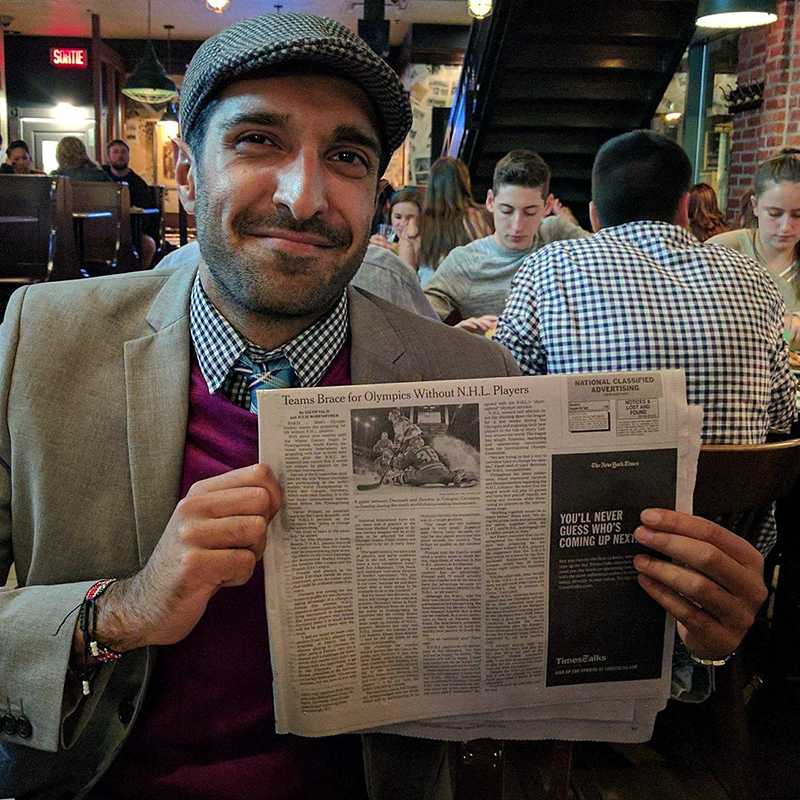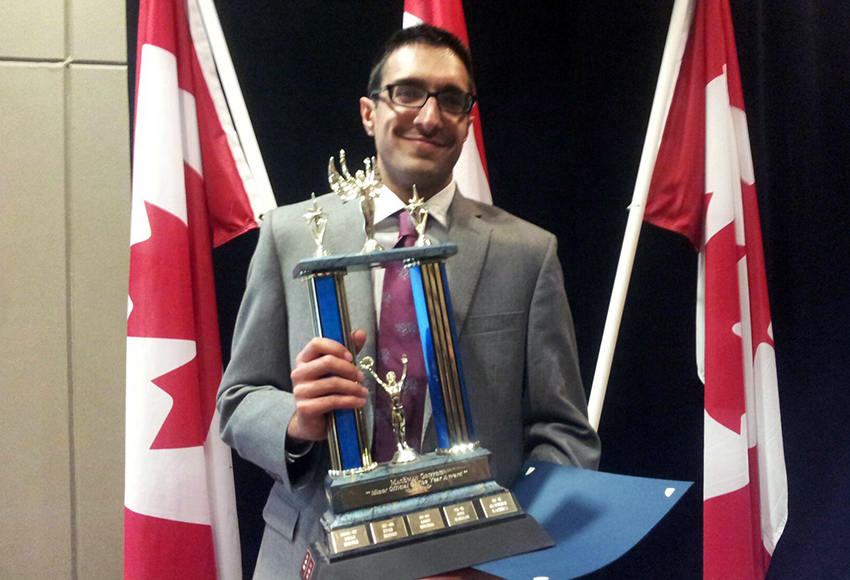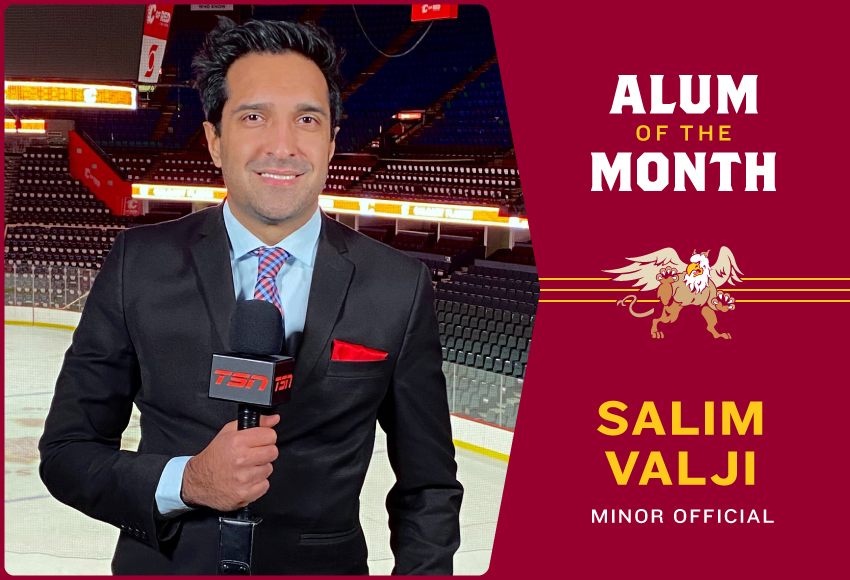Jefferson Hagen, MacEwan Athletics
EDMONTON – It's hard to believe, but just eight years ago, Salim Valji crossed the stage at the MacEwan Athletics awards banquet to pick up his trophy as the Griffins' minor official of the year.
Now, he's on TSN.
There has to be a punchline in there somewhere – 'come work for the Griffins and someday you'll be famous' – but in all seriousness, Valji's meteoric rise to his current role as the network's Calgary Bureau Chief happened out of his own volition.
The Edmontonian first came to MacEwan in 2011 as an education student, keen on becoming a high school teacher. He landed a part-time job on weekends as the Griffins' public address announcer for hockey games.
"It grew throughout that first season into play by play for basketball and volleyball – just whatever they needed," explained Valji. "I think I wrote for the website as well."
He quickly realized journalism was his true calling and switched into that program at MacEwan for the 2012-13 academic year, while getting even more experience with the Griffins.
"I still have pretty fond memories of that time," said Valji. "It was awesome. I really enjoyed that. I think that was my first job in this crazy field.
"The experience itself was really great. You learn how to work hard and how to manage time. It was a great mix of learning the practical elements of working in media plus the camaraderie that is unique to a smaller institution at MacEwan."
Valji finished his journalism degree at Concordia University in Montreal in 2017 – a city he came to love after doing a student exchange there in 2013 – and quickly landed his first big break.
"At Concordia, we did this election broadcast series where we did a live news show about the Canadian federal election on election night," he explained. "And we did the Quebec election. One of my teachers and I had a crazy idea, 'why don't we do one for the France presidential election in 2017?' So, I got accredited for Emmanuel Macron's campaign party at the Louvre and I flew to Paris for that. It was the summer after I completed the degree and I was going to treat myself to a trip anyways.
"The day before I was set to fly from Montreal to France, I just sent a quick e-mail introducing myself to the New York Times sports editor because the world hockey championships were taking place there (in Paris and Cologne, Germany)."
His first story 'Teams Brace for Olympics Without N.H.L. Players' was published by the Times on May 15, 2017.

Salim Valji poses with his first byline in the New York Times from the 2017 world hockey championships in France (Courtesy, Salim Valji).
"That's how that relationship grew – it was just being in the right place at the right time," he said. "It grew into covering the Rogers Cup for them in Montreal and evolved into reporting a lot about race in hockey."
Valji's reporting on the topic – along with fellow Concordia journalism colleague Etienne Lajoie – piqued the interest of the Hockey Diversity Alliance, and it was Valji who first broke the story of its creation on June 8, 2020 in the Times.
"I got to know a few people involved with the HDA, before they were officially involved," explained Valji. "Me and one of my buddies had written two pretty long pieces for the New York Times on race and socio-economic dynamics in hockey. I think a lot of people saw that reporting that Etienne and I did and it just grew from there where I developed a few relationships with people around hockey.
"It was definitely a really busy couple of days putting that together," he continued. "They said they had read a lot of our work and wanted this story to have that platform.
"It was definitely a neat feeling. You just appreciate that people trust you more than anything and I think that's what we want when we're journalists."
Even though Valji believes progress is being made on the issue of racism in hockey and in society in general, he has, unfortunately, experienced it first-hand.
As a person of colour – (his mother is from Kenya, father is from Uganda and great grandparents originally emigrated from India to Africa) – Valji received a wakeup call at his first job out of university in Montreal.
"When I graduated, I had one role in public relations in Montreal that was a pretty overtly racist environment," he said. "It was in sports public relations. It was a really tough situation. In hindsight, it opened my eyes a lot to some of the negative parts of society. That year was pretty tough. I remember being pretty lonely and powerless as a person of colour."
With his public profile enhanced after landing the TSN job in Calgary last November and his Twitter account growing to nearly 5,000 followers, the underbelly of society reared its ugly head once again.
Valji reports he regularly gets racist messages.
In 2021.
"In terms of my experiences, that situation in Montreal definitely opened my eyes to what racism looks like," he said. "I think you sort of expect things now that your profile is more public. I've gotten loads of racist DMs.
"It sucks to say, but you just accept it as a price to pay for the position you're in. Ideally, that stuff doesn't happen, but we're not quite there yet."
Perhaps with the type of reporting done by journalists such as Valji, who is not only able to bring personal perspective on racial issues but actively seeks out stories that highlight social inequities, we may one day realize the eradication of hate.
"I'm hopeful that we're evolving as a sports journalism community and these things are talked about more," said Valji. "It's neat to see the strides that have been taken in the past 18 months, even with the Professional Hockey Writer's Association having workshops. Things that have been reported on, issues that maybe wouldn't have seen the light of day five years ago are being talked about more.
"We're getting there, I think. It's a learning process for everyone, but as someone who's experienced racism first-hand, I take those issues to heart and just try to shed light on different things."
There have been many other issues for Valji to tackle in Calgary, as well. Chief among them on a more traditional sports reporting front has been the disappointing season of the Flames.
Once thought to be a contender, they fired coach Geoff Ward after an 11-11-2 start and replaced him with Darryl Sutter, who remains one of the gruffest, toughest interview subjects in the NHL (one veteran Calgary media member once facetiously nicknamed him 'The Jolly Rancher').
To make matters even more challenging, with the pandemic, Valji and his Calgary media colleagues haven't been allowed in locker-rooms, forced to build relationships with players, coaches and team personnel over Zoom.
"You try to cover it fairly, but the reality is I never met Geoff Ward in person and he was let go as the head coach," said Valji. "You try to be fair to the team, but also the viewers, listeners and readers.
"It's a bit of a feeling out process where right now we can't go into the locker-room and get a gauge of how the team is feeling; those little sidebar chats don't exist anymore because everything's all through Zoom. It's a bit of a challenge in that sense. Even having someone like Darryl Sutter at the helm now, where there's sort of a nuance with how you communicate with him – I'm learning that slowly."
He credits TSN Calgary cameraman Ryan Varty as being key in his acclimation to the city and its sports landscape.
"He's been so great as a teammate and friend," said Valji. "I'm coming from the newspaper world, so I'm learning the nuances of television – how to dress, how to position myself, what writing for television looks like. It's been great to have him to guide me through that."
Never afraid to learn, grow and get better, Valji is becoming more polished every day. It's not unlike at MacEwan when he was constantly trying to hone his craft.
At that time, he was under the tutelage of Griffins events co-ordinator Bob Beaulac and sports information officer Lindsay Bax, to whom he's quick to offer credit for their mentorship.
He still keeps in contact with his old play-by-play partner Kris Kinash and a few of the student-athletes from that time.
"It was awesome. It was such a great environment," he said. "I've worked at a few U Sports schools now and MacEwan was the one that felt like a family the most. It was so tight. The school itself is five or six blocks, so you're seeing people constantly."

Salim Valji receives the Griffins' Minor Official of the Year award for the 2012-13 season (Courtesy, Salim Valji).
Pressed for a moment that stands out during his time with the Griffins, Valji returns with the night the Griffins men's hockey team lost in overtime of Game 2 of their 2013 quarter-final series against Augustana and were eliminated.
"I remember the last men's hockey game I ever saw," he said. "I think for a scheduling reason, I was calling a volleyball game downtown, so I couldn't do the public address announcements. But it was a playoff game at the Bill Hunter and they lost in double overtime. I was there as a fan because I just came back from calling volleyball.
"It was a sad moment at the time. The team lost and it was really heartbreaking, but I think the fans were really proud of the Griffins men's team and they gave them a standing ovation," he added. "It was a nice little moment that sort of encapsulates sports to me – the heartbreak in one moment, but adulation afterward."
In the years since, the Griffins hockey programs grew into a powerhouse – both men's and women's teams won three-straight ACAC Championships from 2017-19 – and Valji achieved his dream of working in media. How he made it can certainly be taken to heart by aspiring journalism students.
"Working hard is cliché, but working smart, as well, and being aware when something isn't necessarily working for you and changing your approach (is key)," he explained. "Definitely build relationships and network and don't be afraid to reach out to people.
"The number one thing I would say is I think we all need one or two people in our lives who are not afraid to tell you the ugly truth. There have been a couple of people in my life who have been brutally honest with me at times and it's worked out."
To sum it up: grow, continue to learn, dream and don't be too hard on yourselves, students.
"I used to think it all had to be perfect, but getting here and realizing the amount of times I screwed up, I definitely put far too much pressure on myself as a student," said Valji. "Maybe I wouldn't have thought it possible this early on (to land a major reporting job), but you do think 'if I'm working this hard, odds are something's got to happen.' "












